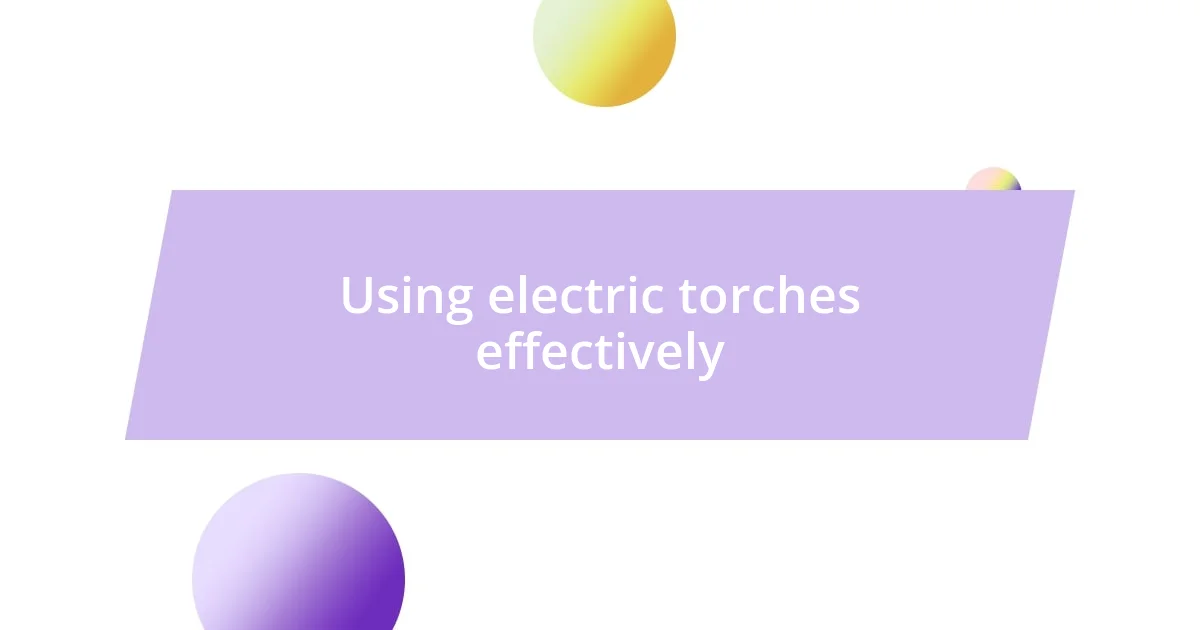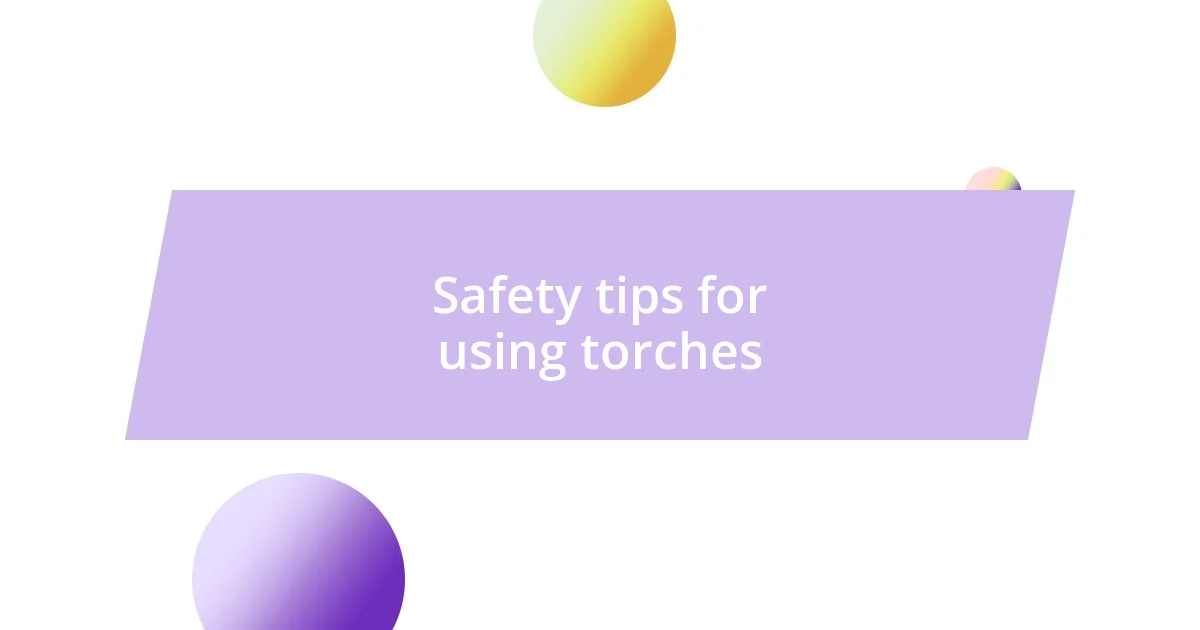Key takeaways:
- Choosing the right torch type requires considering purpose, fuel type, flame control, portability, and safety features.
- Butane torches offer excellent portability and flame precision, making them great for tasks like cooking and crafting.
- Safety is paramount; always wear protective gear, keep a fire extinguisher nearby, and maintain a clear workspace to prevent accidents.

Introduction to torch types
When I first began exploring the world of torches, I was surprised by the vast array of options available. Each type of torch serves a unique purpose, making it essential to choose the right one for your specific needs. Have you ever found yourself puzzled in a hardware store, overwhelmed by choices? I certainly have!
From simple flashlights to sophisticated welding torches, the diversity in design and functionality can be both fascinating and intimidating. I remember the first time I used a butane torch for culinary purposes; the precision it offered fascinated me as I created a perfectly caramelized crème brûlée. It left me wondering how many other industries benefit from these specialized tools.
It’s interesting to consider how the right torch can transform a task. Think about it: whether you’re camping, crafting, or cooking, the torch you select impacts not only your efficiency but also the outcome of your project. This discovery has certainly shaped my approach to various activities, pushing me to delve deeper into understanding torch types and their applications.

Choosing the right torch type
When it comes to choosing the right type of torch, it’s vital to consider what you’ll be using it for. I remember grappling with this decision when I started soldering. The flame from a propane torch can be intense, and while it heats things up quickly, I needed precision for delicate electronic components. Reflecting on my experience, I found that the type of torch can significantly affect your success.
Here are some factors to consider when selecting a torch:
- Purpose: What task do you need the torch for—cooking, soldering, or outdoor activities?
- Fuel Type: Options typically include butane, propane, or electric. Each has its advantages based on ease of use and efficiency.
- Flame Control: Some projects require a more controlled flame; others may benefit from a larger, hotter fire.
- Portability: If you’re on the go, compact and lightweight torches can make a world of difference.
- Safety Features: Look for models with safety locks or built-in ignition systems to prevent mishaps.
Choosing the right torch isn’t just about picking a pretty design; it’s about making an informed decision tailored to your needs. That’s how I finally found a torch that felt like an extension of my own hands while crafting intricate metal pieces—truly exhilarating!

Exploring butane torch functionality
Butane torches are fascinating tools, especially when I consider their functionality. Despite their compact size, these torches deliver a powerful, adjustable flame that’s perfect for precise tasks. I remember the first time I used a butane torch to sear meat; the control I had over the flame was incredible. I felt like a chef in a high-end restaurant, transforming my dish with a simple swipe of my wrist!
When using a butane torch, I appreciate how user-friendly they are. With just a flick of a button, I can create a continuous flame, allowing me to focus on my culinary tasks without fumbling around. Moreover, the instant ignition ensures I can quickly start and stop the flame, adapting to the needs of my cooking. This level of convenience can make any cooking or crafting experience more enjoyable and efficient.
To get a clearer understanding of how butane torches stack up against their counterparts, here’s a quick comparison table:
| Feature | Butane Torch | Propane Torch | Electric Torch |
|---|---|---|---|
| Portability | Highly portable and lightweight | Less portable, often bulkier | Dependent on power source |
| Flame Control | Excellent precision | Intense but less control | Constant, limited adjustment |
| Ignition | Instant and easy | Requires a separate igniter | On/off switch |
| Fuel Type | Butane gas | Propane gas | Electricity |

Using electric torches effectively
Using electric torches effectively has transformed the way I approach my projects. One time, while working on a DIY electronics project, I discovered that adjusting the heat settings on my electric torch made all the difference. It allowed me to delicately solder small components without risking damage. Can you imagine the relief of knowing you have complete control over the heat? That experience taught me that understanding your tool is just as important as the project itself.
Maintaining the right distance from your workpiece is crucial when using an electric torch. I learned this the hard way when I accidentally overheated a nearby component, leading to a frustrating setback. Now, I always ensure to keep the flame at a safe distance and consistently check how the material responds to the heat. This attention to detail not only saves time but also greatly improves the quality of my work. Have you ever had a similar mishap that made you rethink your approach?
Another essential tip is to always have a well-ventilated space. I remember using my electric torch in my basement, thinking I could close off the area to stay focused. However, the fumes quickly became overwhelming, and I had to stop. Now, I make it a point to set up in an open area or near a window. It’s amazing how much easier and safer it is to work in a well-aired environment. Don’t you think that a comfortable workspace makes all the difference in our creative process?

Comparing torch performance in tasks
When it comes to comparing torch performance in tasks, I’ve found that each type brings its unique advantages. For example, when I used a propane torch on a particularly chilly day, the intense heat was perfect for outdoor soldering. However, I quickly realized that the cumbersome nature of the torch made it tricky to maneuver in tight spaces. Have you ever wrestled with a tool that just didn’t fit the job?
On the other hand, my experience with electric torches has often been marked by reliability, especially for precision tasks like electronics repairs. I recall a nerve-wracking moment when I needed to solder a fragile circuit board. The electric torch’s steady and adjustable heat gave me the confidence to proceed without second-guessing my every move. Have you experienced that mix of anxiety and excitement when using a new tool? It truly highlights the importance of selecting the right torch for the job.
Butane torches have also played a significant role in my crafting endeavors. I remember lighting up a temporary patio firepit for friends on a summer evening. The compact and portable nature of my butane torch made starting the fire a breeze, and I felt a sense of camaraderie as everyone gathered around. The flame was adjustable, allowing me to create the right ambiance without overwhelming heat. Isn’t it fascinating how the right tool can enhance our shared experiences?

Safety tips for using torches
It’s critical to always wear protective gear when using any type of torch. The first time I used my propane torch, I stubbornly skipped the safety goggles. I quickly learned my lesson when a small spark flew up and singed my eyebrow. I can’t stress enough how essential it is to prioritize your safety by wearing the right equipment—after all, it’s better to feel silly in a pair of goggles than to risk serious injury.
Keeping a fire extinguisher nearby is something I now make a constant habit. I still remember a close call when my workspace got too hot too quickly during a project. Although nothing serious happened, the memory of that moment still lingers. It reminded me just how important it is to be prepared for the unexpected. Do you take safety measures in your workspace? A small investment in safety can save a lot of heartache later.
Finally, always keep your working area clear of flammable materials. There was one instance when I had a stray piece of cardboard too close to my butane torch, and it started smoking. Seeing that little plume rise gave me such a jolt of anxiety! Since then, I consciously clean up my workspace before igniting any flame, and I encourage you to make it a habit as well. It’s a simple step that goes a long way in preventing accidents and ensuring a smoother work experience.














